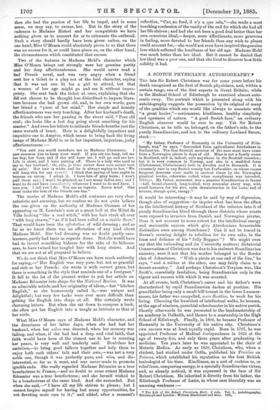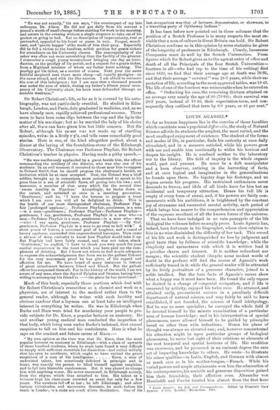A SCOTCH PHYSICIAN'S AUTOBIOGRAPHY.* THE late Sir Robert Christison was
for some years before his death recognised as the first of Scotch physicians, and, within a certain range, one of the first experts in Great Britain; while in the Medical School of Edinburgh he exercised almost auto- cratic sway. The portrait which is presented along with his autobiography suggests the possession by its original of many of the qualities which one would like always to associate with "a great healer,"—seriousness, kindliness, healthy simplicity and openness of nature. " A good Scotch face," an ordinary English observer would be sure to say. Yet Sir Robert Christison, as he tells us, belonged, on the father's side, to the purely Scandinavian, and not to the ordinary Lowland Saxon, stock :-
" My father, Professor of Humanity in the University of Edin- burgh, was," he says, "descended from agricultural forefathers in Forfarshire. The first Soottish member of the race must have come from a Norwegian pirate in days of old. Mine is not a family name in Scotland, and is, indeed, rare anywhere in the Scottish counties; but it is very common in Norway, and also in a modified form (Christensen, Christiansen) both in Sweden and in Denmark. It is extremely rare in any Scotch county but Forfarshire, on whose coasts frequent descents were made in ancient times by the Norwegian piratical hordes, otherwise called, when compliment was intended, Vikings. My father, moreover, was a genuine Scandinavian in frame —tall, broad cheated, long-bodied, very muscular every way, with small features for his size, calm determination in his looks, and of intense, though quiet, energy."
It would be interesting—it may be said by way of digression, though also of suggestion—to inquire what has been the effect on the intellectual history of Scotland of the infusion into it of purely Scandinavian blood through those districts whose coasts were exposed to invasion from Danish and Norwegian pirates. Does it not account to some extent for the intellectual energy and mercantile success which give Aberdonians honourable distinction even among Scotchmen? Can it not be traced in Burns's seeming delight in rebellion for its own sake, in the foam and defiance of his " Jolly Beggars " P We might even say that the unbending and (in University matters) dictatorial Conservatism of Christison was due to his stalwart Scandinavian ancestry, were it not that his mother belonged to the Border clan of Johnstones. " With a pirate at one end of the line," he says, " and a robber at the other, one may fairly claim to a decent ancestry." And perhaps Christison's Toryism was, like Scott's, essentially feudalism, being Scandinavian only in the vigour and success with which it was asserted.
At all events, both Christison's career and his father's were characterised by rapid Scandinavian dashes at position. His grandfather being only a small hill-tenant in the lower Lammer- moors, his father was compelled, more Scottico, to work for his living. Choosing the humblest of intellectual walks, he became, at the age of nineteen, parochial schoolmaster in his native parish. Shortly afterwards he was promoted to the headmastership of an academy in Dalkeith, and thence to a mastership in the High School of Edinburgh. Finally, in 1806, he became Professor of Humanity in the University of his native city. Christison's own success was at least equally rapid. Born in 1797, he was appointed Professor of Medical Jurisprudence in 1822 at the age of twenty-five, and only three years after graduating in medicine. Ten years later he was appointed to the chair of Materia Medics. As early as 1829, Christison, who, when a student, had studied under Orfila, published his Treatise on Poisons, which established his reputation as the first British toxicologist of his time. Kindliness, as a sort of cushion to, or relief from, conquering energy, is a specially Scandinavian virtue, and, as already noticed, it was expressed in the face of Sir Robert Christison. He inherited it directly from his father, the Edinburgh Professor of Latin, in whose case liberality was an amusing weakness :—
• The Life of Sir Robert Christison, Bart. 2 vols. Vol. I., Autobiography, Edinburgh and London : William Blackwood and Sons. 1885. " He was not exactly," his son says, " the counterpart of my late colleague, Dr. Alison. He did not get daily from his servant a pound's worth of small change before starting for work in the morning, and return in the evening without a single sixpence to take out of his pocket on going to bed. But no description of impecuniosity, real or pretended, appealed to his heart or purse in vain. Pauper, mendi- cant, and 'gentle beggar' alike made of him their prey. Especially did he fall a victim to the heedless, selfish petition for gratis tickets for attendance on his University classes. The unscrupulosity of the esker was often not more astonishing than the facility of the granter. I remember a rough young mountaineer bringing one day an intro- duction, as the prodigy of his parish, and a request for a gratis ticket, from a Highland minister of whom my father knew nothing. The prodigy got his ticket, as a matter of course. Next year the same faithful shepherd sent three more sheep—all equally prodigies—on the same errand, and with the like success. I am afraid to estimate the cost of this indulgence ; but I am sure that a thousand pounds was under the sum of which, during my father's fifteen years' won- palmy of his University chair, his heirs were defrauded through an amiable weakness."
Sir Robert Christison's life, so far as it is covered by his auto- biography, was not particularly eventful. He studied in Edin- burgh, London, and Paris, duly graduated in medicine, and, as we have already seen, rapidly achieved professional success. There seem to have been some slips between the cup and the lip in the matter of his marriage ; but as he married the lady of his choice after all, these can have given him but little concern. But Sir Robert, although his career was not made up of startling episodes, writes in a lively s' 3re, and tells some remarkably good stories. Here is one, of its kind altogether perfect, about a dinner at the laying of the foundation-stone of the Edinburgh Observatory. The Chairman was Professor Playfair, Sir Robert Christison's teacher in physics. Having made a pithy speech,— " He was vociferously applauded by a guest beside him, the officer commanding the artillery of the district, who was also one of his students. In an evil moment it occurred to those near him to suggest to Colonel Smith that he should propose the chairman's health, an invitation which he at once accepted. Now, the Colonel was a bluff soldier, brought up in campaigns, more accustomed to speak to his guns than to a sea of scientific faces, all gazing into his own ; and, moreover, a member of that army which for the second time swore terribly in Flanders.' Accordingly, he broke down at the outset, and subsided at once in a startling peroration. Gentlemen,' said he, I have the honour to propose a toast which I am cure you will all be delighted to drink. This is the health of our most distinguished chairman, Professor Play- fair [prolonged applause j. Professor Playfair, gentlemen, is a man —is a man—gentlemen ; Professor Playfair—Professor Playfair- gentlemen, I say, gentlemen, Professor Playfair is a man who—a man—Professor Playfair is a man, gentlemen—is a man who—who —who—I say again, gentlemen, Professor Playfair—By God, gentlemen, Professor Playfair is a man to go even to hell witk !' A short pause of horror, a universal peal of laughter, and a round of hearty applause, succeeded this unprecedented harangue. Then came a silence of deep curiosity to know how Playfair would take it up. But Playfair had been fairly roused, and was not taken aback.
Gentlemen,' he replied, have to thank you very much for your cordial concurrence in the toast which you have paid me the com- pliment of drinking. But I know not where to find words adequate to express the acknowledgments duo from me to the gallant Colonel for the very uncommon proof he has given of his regard and affection for me. We have heard of many instances in history of great attachment between friend and friend. But the gallant officer has surpassed them all. For in the history of the world, I am not aware of any man, since the days of Pylades and Orestes, having been willing to accompany his friend to — the place he has mentioned.'
Much of this book, especially those portions which deal with Sir Robert Christison's researches as a chemist and work as a physician, are of interest to the medical rather than to the general reader, although he writes with such lucidity and obvious candour that a layman can at least take an intelligent interest in everything be writes. He was in Edinburgh when Burke and Hare were tried for murdering poor people to pro- vide subjects for Dr. Knox, a popular lecturer on anatomy. He and another young medical man conducted the inspection of that body, which being seen under Burke's bedstead, first caused suspicion to fall on him and his confederate. Here is what he says on the conduct and future career of Knox :—
" My own opinion at the time was that Dr. Knox, then the most popular lecturer on anatomy in Edinburgh—with a class of upwards of three hundred students, whom he must have found it very difficult to supply with sufficient materials for dissection—had rather wilfully shut his eyes to accidents, which ought to have excited the grave suspicions of a man of his intelligence Knox, a man of undoubted talent, but notoriously deficient in principle and in heart, was exactly the person to blind himself against suspicion, and to fall into blamable carelessness. But it was absurd to charge him with anything worse. He never recovered, in Edinburgh society, from the stigma which thus attached to him. His talent as a lecturer kept his class-room crowded as usual, but only for a few years. The numbers fell off at last ; he left Edinburgh ; and after various vicissitudes, and successive descents, he sank, before his death in London, to a state not much above destitution. One of his last occupations was that of lecturer, demonstrator, or showman, to a travelling party of Ojibbeway Indians."
It has been before now pointed out in these columns that the position of a Scotch Professor is in many respects the most en- viable that a man of culture in Great Britain can hold. Sir Robert Christison confirms us in this opinion by some statistics he gives of the longevity of professors in Edinburgh. Clearly, Insurance Companies must do well by the Scotch Universities. From figures which Sir Robert gives as to the ages at entry of office and death of all the Principals of the four Scotch Universities— fourteen in all—who had (up to the time of his writing) died since 1820, we find that their average age at death was 7816, and that their average " survival " was 28.0 years, while their ex- pectation of life, according to the most approved tables, was 19.41. The life of one of the fourteen was uninsurable when he enteredon office. " Deducting his case, the remaining thirteen attained on an average very nearly the age of 80 (79-84); their survival was 281 years, instead of 1940, their expectation-term, and con- sequently they outlived that term by 8.9 years, or 46 per cent."











































 Previous page
Previous page